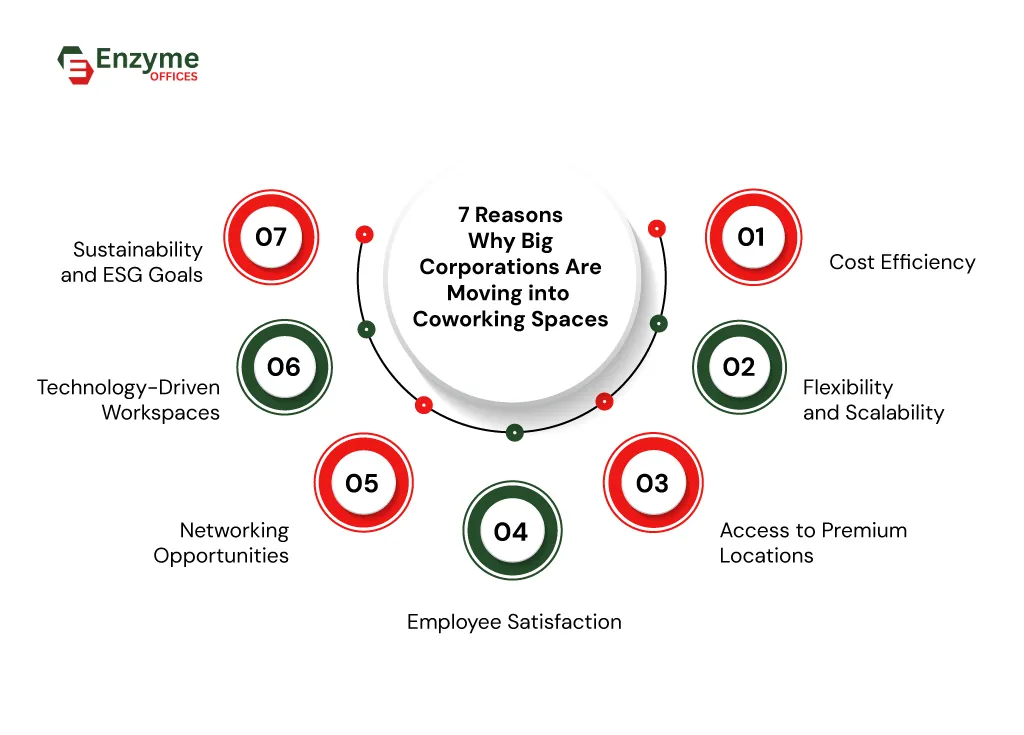Quick Summary
- The Indian coworking market is projected to grow from USD 0.71B in FY2024 to USD 1.96B by FY2032 (13.47% CAGR), with strong demand coming from large enterprises and MNCs.
- Corporations opt for coworking spaces as it allows them to reduce real estate costs by about 25–30% cost savings per employee).
- Additionally, coworking spaces offer benefits such as flexible rental terms, scalability, and ready-to-use amenities.
- Unlike traditional office setups, coworking spaces don’t require large upfront investment or long-term commitment.
Large enterprises are adopting flexible coworking spaces instead of the traditional long-term office rental. According to a Market and Data report, the Indian co-working space market was about USD 0.71 billion in FY2024 and is expected to reach USD 1.96 billion by FY2032, to grow at a CAGR of 13.47%.
Many Fortune 500s and leading Indian enterprises are now choosing coworking spaces for corporate use. This trend shift is happening due to the remote and hybrid working model. This raises a question: why big corporations are moving into coworking spaces when they can afford conventional leases or even build their own office space?
In this blog, we will explore the reasons why corporations are opting for coworking spaces and conduct a brief comparison between traditional office spaces and coworking spaces for corporations.
Table of Contents
|
What Are the Top Reasons for Big Corporations Moving into Coworking Spaces?
The shift toward coworking spaces is not only a global trend; it is also happening in India. MNCs or large Indian corporations are increasingly adopting flexible workspaces to improve agility, cost savings, and employee experience.

1. Cost Efficiency
Traditional office rentals come with long-term obligations, high setup costs, and hidden charges. Corporate coworking spaces significantly reduce those costs and offer an affordable office solution.
A report by Mordor Intelligence indicates that companies using flexible offices can reduce real estate costs by 25–30% per employee, while ensuring they have access to all essential amenities.
Here is how coworking spaces reduce costs:
- No costs for electricity, internet, cleaning, or security, everything is included..
- No need for separate facility management teams.
- Scalable pricing models that align with actual team size.
According to Mint report, in 2023, coworking spaces in India’s top seven cities captured a 27% share of net office space absorption, which is up from just 14% in 2019, indicating a rising trend of adopting coworking spaces.
2. Flexibility and Scalability
For large corporations, the flexibility to increase space is critical, but traditional offices have limitations and don’t allow quick expansion. Coworking spaces allow businesses to scale workspace on demand. You can add desks or private cabins almost instantly for project-based or seasonal needs.
These office spaces allow you to:
- Scale the number of seats or space on a project basis.
- Adjust space usage monthly or quarterly, without any long-term commitments.
- Test new markets with minimal risk.
Suggested Read: Why Startups and Growing Businesses Prefer Managed Office Spaces
3. Access to Premium Locations
Renting an office space in Whitefield, Bangalore, Nariman Point, Mumbai, or such premium locations in major cities involves massive costs. Coworking spaces allow you to access office space at a premium location without the long-term commitment or high upfront fees. The benefits of choosing office space in a prime location include:
- Presence in financial hubs or central business districts without high capex.
- Enhanced brand perception with prestigious office addresses.
- Easier access for clients, partners, and employees.
4. Employee Satisfaction
Today’s employees want a modern, comfortable, and collaborative work environment. Coworking spaces are designed to provide a seamless experience for employees. Apart from desks, most corporate coworking spaces offer facilities including:
- Ergonomic furniture, natural lighting, and collaborative lounges.
- On-site amenities like gyms, cafeterias, and wellness programs.
Suggested Read: The Role of Amenities in Office Spaces in Enhancing Work-Life Balance
5 Networking Opportunities
Unlike isolated corporate offices, coworking spaces provide opportunities to meet with experts from other industries. Even large enterprises can become part of the ecosystem alongside startups, freelancers, and innovators.
- Exposure to fresh ideas and agile working styles.
- Knowledge exchange with entrepreneurs and domain specialists.
- Potential for partnerships, co-innovation, and faster problem-solving.
6 Technology-Driven Workspaces
In today’s highly competitive business environment, every organisation needs cutting-edge technologies and secure infrastructure to ensure uninterrupted operations. Coworking spaces provide access to the latest technologies without heavy investment. Here are the facilities you can avail of when you choose a coworking space.
- 24/7 IT support, high-speed internet, and cloud-ready infrastructure.
- Video conferencing and AV facilities for collaborating with clients and remote employees.
- Enterprise-grade security, access control, and compliance with data privacy regulations.
7. Sustainability and ESG Goals
Environmental, Social, and Governance (ESG) has become a critical component of corporate strategy, and adhering to these regulations is essential. Coworking spaces are designed to support these initiatives through shared resources and green infrastructure. Choosing a coworking space offers benefits such as:
- Reduced carbon footprint through shared utilities and optimised space usage.
- Many operators integrate LEED or green building certifications.
- Eco-friendly practices like energy-efficient lighting and waste reduction.
Traditional Offices vs. Coworking Spaces for Corporations – A Quick Comparison
Factor |
Traditional Offices |
Coworking Spaces |
|
Setup & Capital Investment |
High upfront CAPEX for furniture, interiors, and infrastructure. Long lead times before operations can start. |
No upfront investment. Plug-and-play setup with ready-to-use workstations. |
|
Lease Terms |
Long-term commitments (5–9 years typical in Indian metros). |
Flexible plans (daily, monthly, yearly). Suitable for project-based or scaling teams. |
|
Operational Cost |
Separate expenses for utilities, housekeeping, IT support, and facility management. |
All-inclusive pricing covering utilities, internet, maintenance, and services. |
|
Scalability |
Expanding or downsizing is difficult and costly. |
Easy to scale up or reduce seats depending on workforce needs. |
|
Location Access |
Prime business districts are often unaffordable for many corporations due to high rentals. |
Affordable access to premium locations and Grade-A buildings. |
|
Employee Experience |
Limited amenities unless corporates invest in gyms, cafeterias, wellness, etc. |
Modern amenities such as gyms, cafés, wellness zones, breakout lounges, and event spaces. |
|
Networking Opportunities |
Closed environment, limited cross-industry exposure. |
Exposure to startups, freelancers, and other corporates, enabling collaboration and innovation. |
|
Technology & Infrastructure |
Requires in-house IT teams for setup and support. |
Ready tech infrastructure with 24/7 IT support, hybrid-work tools, and enterprise-grade security. |
Final Takeaway
The massive growth of coworking spaces in India indicates that large enterprises are increasingly opting for flexible coworking office solutions. The main reasons why they choose coworking are cost efficiency and the flexibility these workspaces offer. However, selecting the right coworking office partner is the key to ensuring long-term stability and scalability to accommodate future growth.
Enzyme Offices provides fully managed coworking solutions in Bangalore, Mumbai, Delhi, and other major cities. With flexible plans, prime locations, and customizable office space, Enzyme Offices offer the perfect work environment for corporates to thrive in today’s dynamic market.
Contact us to share your requirements, and we will offer the right solutions according to your needs.
Frequently Asked Questions
- What is the difference between traditional office spaces and coworking spaces?
Traditional office spaces require long-term leases, massive upfront investments in infrastructure, and management of utilities. They provide complete control but come with higher costs and less flexibility.
- How do coworking spaces help businesses reduce operational costs?
With coworking spaces, you don’t need to invest in real estate, furniture, and utilities. Moreover, the coworking provider offers services like housekeeping, internet, utilities, and security, helping businesses save costs.
- What factors should you consider before choosing a coworking space?
You should evaluate the office location, amenities, rental flexibility, and scalability options before renting a coworking space.
- Does coworking space support hybrid or flexible work models?
Yes, coworking office providers design spaces that cater to hybrid work models. Most coworking spaces, including Enzyme Offices, offer hot desks, meeting rooms, collaboration zones, and flexible seating plans to support remote and in-office employees.
- Can I scale up or down my team size with Enzyme Offices’ coworking solution?
Yes, Enzyme Offices allows businesses to expand or reduce their office space without the hassle of relocation, which is ideal for businesses with dynamic team sizes.


